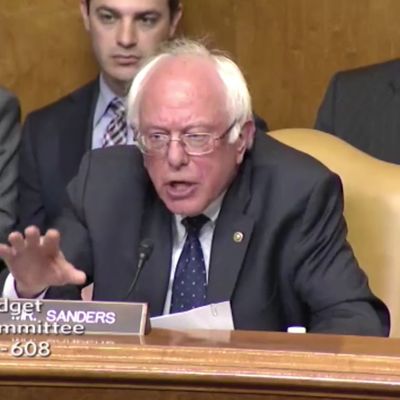
Certain conservative Christians have made a habit in recent years of complaining that their “religious liberty” is threatened if they are not allowed to fully express and reflect their beliefs in public life, including public office. A notable example was Kentucky county clerk Kim Davis, who refused to issue marriage licenses for same-sex couples despite a U.S. Supreme Court decision making equal access to marriage a matter of federal constitutional law.
But just as paranoid people have real enemies, complaints about religious liberty aren’t all specious. Just yesterday we saw an example of a distinguished U.S. senator in a confirmation hearing who came pretty close to embracing the kind of “religious test … as a qualification to any office or public trust” that is explicitly prohibited by Article VI of the U.S. Constitution.
When questioning a presidential nominee for deputy director of OMB, Russell Vought, Senator Bernie Sanders kept going back to a January 2016 article Vought wrote for Erick Erickson’s conservative website, the Resurgent, involving a controversy at the famously conservative Wheaton College (Vought’s alma mater) where a professor got into hot water for saying that Christians and Muslims “worship the same God.” Vought defended Wheaton’s actions against the professor, partially on grounds that she was challenging the “orthodox Christian” belief that salvation is extended only to those who explicitly accept Jesus Christ.
Sanders took strong exception (according to Emma Green’s transcription) to Vought’s views:
“In my view, the statement made by Mr. Vought is indefensible, it is hateful, it is Islamophobic, and it is an insult to over a billion Muslims throughout the world,” Sanders told the committee during his introductory remarks. “This country, since its inception, has struggled, sometimes with great pain, to overcome discrimination of all forms … we must not go backwards.”
Vought tried to counter that his opinions on the access of non-Christians to eternal life did not mean he disrespected them in this life: “As a Christian, I believe that all individuals are made in the image of God and are worthy of dignity and respect, regardless of their religious beliefs.” But Sanders kept coming back to the “stand condemned” language and concluded that Vought was “really not someone who is what this country is supposed to be about.”
Like Emma Green (and more predictably, conservative “religious liberty” culture-warrior David French), I think it’s hard to deny Sanders was proposing a “religious test” for public office. As Green put it:
It was a remarkable moment: a Democratic senator lecturing a nominee for public office on the correct interpretation of Christianity in a confirmation hearing putatively about the Office of Management and Budget.
And it wasn’t just Sanders. Senator Chris Van Hollen made it clear he thought Vought’s kind of Christianity was very different from his own. I happen to share Van Hollen’s assessment of exclusivist Christianity. But while I think Vought ought to be questioning his own spiritual health instead of questioning that of others, his views should not disqualify him for public office, in direct contradiction of an express prohibition in the Constitution.
Vought’s day job before this nomination was at Heritage Action, where he was a vice-president. I am sure he said and did things there that would merit a vote against his confirmation for a major position at OMB, and the hearing did touch on some of them. But his faith, however much it distresses me — and Bernie Sanders — is not an acceptable reason for excluding him.






























